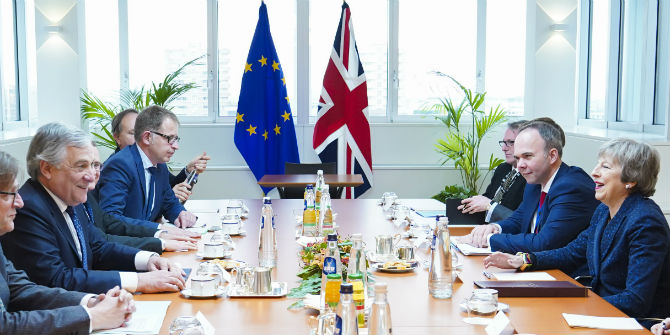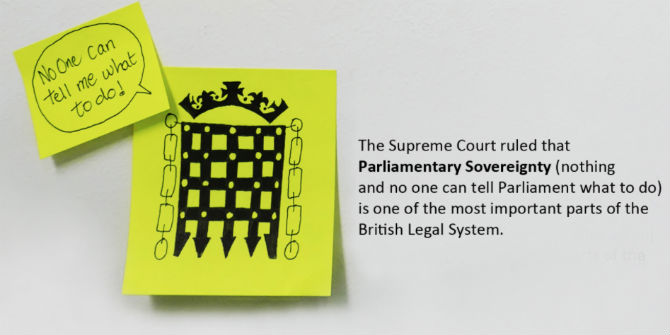 Sam Fowles (Cornerstone Barristers) looks at the ramifications of extending the Article 50 period. Unless the UK leaves the EU before 1 July, it must either hold European Parliament elections or seek a change in the Treaty on European Union.
Sam Fowles (Cornerstone Barristers) looks at the ramifications of extending the Article 50 period. Unless the UK leaves the EU before 1 July, it must either hold European Parliament elections or seek a change in the Treaty on European Union.
With the second defeat of Theresa May’s Withdrawal Agreement, the subsequent vote to reject a “no-deal” Brexit, and her application to extend the Art. 50 period, we must consider the legal practicalities of such an extension.

Art. 50(2) provides that, once a state has submitted a notification that it intends to leave the EU, that state will leave the EU after a period of two years, regardless of whether an agreement has been reached on the terms of withdrawal. This means that parliamentary votes (or even an Act of Parliament) on ruling out a “no-deal” Brexit and/or extending the deadline for leaving the EU are of political or indicative value only. Parliament has no power to rule out a “no-deal” Brexit or to extend the Art. 50 period. The former will happen by operation of EU law unless either an agreement is reached, or the deadline is extended. Under Article 50(3)-(4), the latter can only happen following a unanimous decision of the European Council – which consists of representatives of the 27 other EU member states. An extension is, therefore, within the gift of the EU 27, not the UK Parliament.
If the Art. 50 period is extended, then the UK, as a member of the EU, must have representation in the European Parliament (Treaty on European Union (“TEU”), Art. 14). UK citizens (and citizens of other EU states resident in the UK) have a right to stand or vote. The current UK MEPs are not entitled to sit after 1 July 2019 (Treaty on the Functioning of the European Union (“TFEU”), Arts. 20 and 22).
If the UK remains in the EU after the expiry of the current UK MEPs’ terms on 1 July 2019, but does not hold new elections, then both the European Commission and citizens living in the UK will have a cause of action against the UK. Citizens have a potential claim for denial of their right to stand and vote, and the Commission has a potential claim for breach of the treaties. It is possible that, on the basis of an agreement between the UK and the EU, the Commission will refrain from enforcing its cause of action, but no such agreement can extend to citizens. Depending on the length of the extension, the UK may potentially avoid liability, however, by the simple expedient of ensuring that it leaves the EU before any claim against it has made its way through the courts.
It appears that the European Commission will only support an extension under three sets of circumstances: (1) to allow time to ratify the Withdrawal Agreement, (2) to allow additional time to prepare for a “no-deal’ Brexit, or (3) to allow time for a general election or another referendum. The reactions of a number of European leaders in the wake of the government’s defeat on Tuesday suggest that they are thinking along the same lines. The matter is complicated by the fact that European elections are scheduled for 23-26 May. This raises the question of whether, should the Art. 50 period be extended, the UK must hold European elections.
An extension to provide time to ratify the Withdrawal Agreement is unlikely to be lengthy. Under section 13 of the EU (Withdrawal) Act 2018, the Withdrawal Agreement cannot be ratified until (a) the House of Commons has voted in favour of the agreement and (b) Parliament has passed an Act providing for the implementation of the agreement. The Agreement must also be laid before Parliament for 21 days in accordance with the Part II of the Constitutional Reform and Governance Act 2010. The chief barrier to ratification is, obviously, that the Commons have twice refused to approve the Agreement. It seems unlikely that the House will change its mind unless the Agreement undergoes changes of the sort that, the EU says, will not be forthcoming. If this hurdle were to be surmounted, however, the rest of the ratification process could, from a legal perspective, be accomplished in a matter of months.
The UK need not hold European elections if the Art. 50 extension ends on or before 1 July 2019 (13 weeks from the 29 March, the day on which the UK is currently scheduled to leave the EU). This seems to be sufficient time to allow for ratification of the Withdrawal Agreement but, given the political barriers to ratification, this may well be a moot point.
Preparing for a “no-deal” Brexit or holding a general election or referendum could take substantially longer. Sections 2-3 of the Fixed Term Parliaments Act 2011 provide that a general election can be held within a period of seven weeks. A referendum, however, will take between 10 and 22 weeks. Part VII of the Political Parties, Elections, and Referendums Act 2000 requires a minimum 10-week campaign period for referendums. The Electoral Commission has a statutory duty to test any referendum question before a referendum is held. This typically takes 12 weeks. A more detailed examination of the practical requirements for a referendum can be found here. While the authorising statute for a referendum can provide for a shorter campaign period, it seems unlikely that a referendum can be held with anything less than several months preparation.
If European elections are to be held then they must be held between 23-26 May 2019 (Decision 2018/767, per Decision 76/787/ECSC, EEC, Euratom, Art. 11(2)). The UK may be permitted to remain in the EU without electing new MEPs if the EU treaties (the Treaty on European Union and Treaty on the Functioning of the European Union) are revised (likely by addition of a protocol). This requires (at minimum) a conference of member states (TEU, Art. 48). In practice this can be arranged in a matter of weeks.
If the UK leaves the EU before 2 June 2019 then its seats in the European Parliament will be partially reallocated and partially eliminated. If the UK remains a member after 2 June 2019 then it will retain its existing seats (73) until such a time that it leaves the EU (Decision 2018/037, Art. 3(2)).
The reality, therefore, is that according to the law as it stands, it is likely that the UK must either hold European elections or seek treaty change in the event of an extension of the Art. 50 period.
This post represents the views of the author and not those of the Brexit blog, nor the LSE. It first appeared at the UK Constitutional Law Association blog.
Sam Fowles is a barrister at Cornerstone Barristers and advised the shadow cabinet on the extension of the Article 50 period.







There something niggling me about Article 50.The Gina Miller case resolved, for several reasons, that Article 50 Notice could only be given with the authorisation of an Act of Parliament. The 2017 Notice of Withdrawal Act only gave permission to ‘give notice’. It did not make any provision for a possible extension to our Article 50 notice, nor does the 2018 EU Withdrawal Act. That act only comes into force after Article 50 has expired, it merely allows ‘exit day’ to be amended in order to account for ‘when the treaties cease to have effect’. If the Gina Miller case required authorisation for the giving of notice, it would follow that if the government wish to qualify that notice they need the specific authority of statute. If the government could be shown not to have such authorisation then any extension, however willingly offered by the EU27, may not be legally enforceable.
The question of the legality or otherwise of May’s prime ministership during the last few years easily dwarfs the issue of the legal practicality of extending the Article 50 notice, one would have thought. In the event, although much is made of the obligation on the part of the UK to partake in the EU elections if the coming into effect of Article 50 notice is put back somehow, both the EU and the UK have gravely undermined the public trust in elections and referendums. MEPs have only rubber stamp ability. As has become patently obvious to all, even the remainers who would be happy to see the referendum result overturned, the insistence that the rules concerning elections be adhered to does not stretch to honouring the results. The EU has blithely ignored the results it didn’t like and made a mockery of referendums. The UK government, this time, has followed a different path to the same end-overturn the referendum result by other means. Now, desperate because May’s strategy did not work out as expected, another referendum is allowed to creep over the horizon. Really…
Remoaners need to get a grip and think about this. Remoaners would see the rules thrashed when it suits, but expect Brexiteers to meekly follow the resurrected rules when it suits the Remoaners. The damage has been done. What follows is unclear, but it will be some time before new rules can be agreed to, and agreed to be followed, by all contenders.
The fact that Yvette Cooper is trying to rush her bill through Parliament and then Lords… at the same time May is going off alone without Parliament and changing the law regarding Article 50 proves we actually DID leave the EU on March 29th and May is behaving illegally.
Any variation to the end date of Article 50 is a change in British law and not Theresa May – nor any Government – can do that unilaterally as the Miller case established. Where has Miller’s passion gone…? (I smell a plant or a UK citizen abusing her wealth saying it was out of principle… but that principle is being betrayed here) She has nothing to say… nor does the rest of Parliament who are still going through the correct processes ie Yvette Cooper…. even if they are trying to break precedent and get the Lords to pass it without looking at it…
I’m finding it impossible to see how British Law, as created by Parliament in enacting Article 50 2 years ago, does not record that Britain DID leave the EU on March 29th and this Parliament is now acting illegally.
Because a change in British law (extension to Article 50) has not been completed by Parliament.
We are in a lawless state and out democracy has been betrayed in a way that it cannot be recovered.